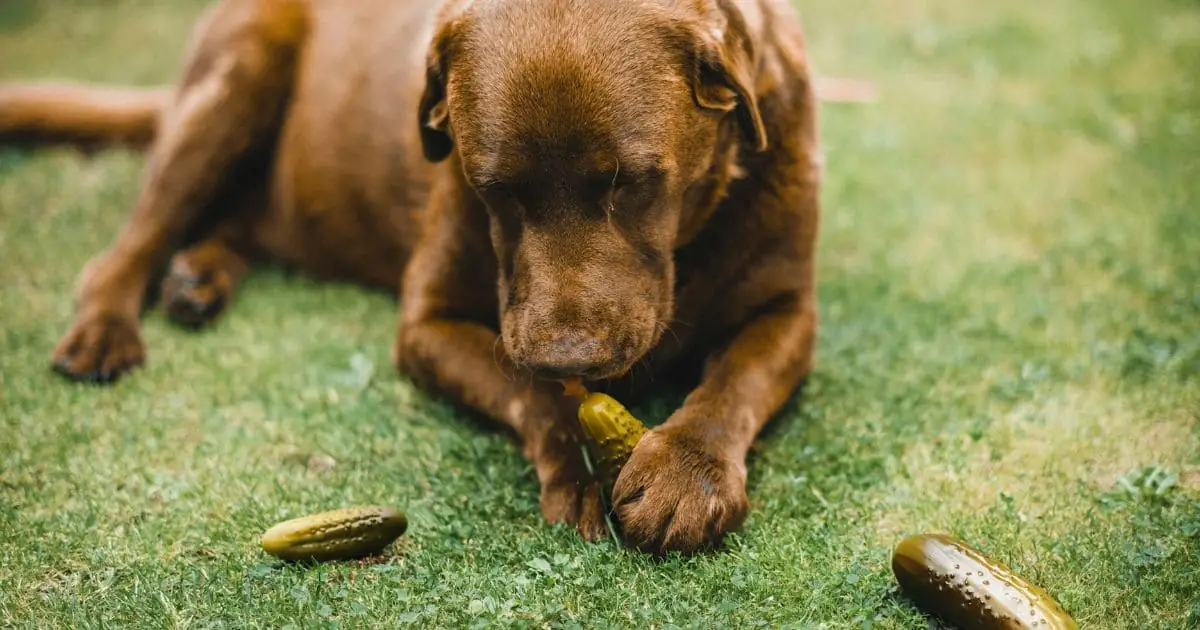Welcome to Loki & Nala Family

Table of Contents
Introduction
Pickles are a popular, tangy snack enjoyed by many people, whether on their own or as an addition to sandwiches and burgers. But as a dog owner, you might wonder if this salty, crunchy treat is safe for your furry friend. ‘Can dogs eat pickles?’ is a common question, especially when your dog eyes your food with those irresistible puppy-dog eyes. In this article, we’ll explore whether or not pickles are safe for dogs, the types of pickles to avoid, and what healthier alternatives you can offer instead. You might also be interested in reading Can Dogs Eat Salmon Skin?
Can Dogs Eat Pickles?
The short answer is: it depends. Pickles themselves are not toxic to dogs, but they aren’t exactly the best treat either. While plain cucumbers are safe and healthy for dogs, pickling them in brine, vinegar, and salt can make them a risky snack. Some pickles also contain seasonings like garlic and onions, which are toxic to dogs. So, while the occasional plain pickle may not be harmful, feeding pickles regularly is not recommended.
Are Pickles Safe for Dogs?
The biggest concern with pickles is the high sodium content. Pickles are preserved in a brine that contains a significant amount of salt. Excessive salt intake can result in dehydration and, in extreme situations, sodium ion toxicity in dogs. This condition may lead to symptoms including vomiting, diarrhea, muscle tremors, and potentially seizures. Additionally, the vinegar and other spices in pickles can irritate your dog’s stomach, leading to gastrointestinal discomfort.
If you accidentally drop a pickle and your dog eats it, there’s no need to panic—one pickle is unlikely to cause any severe harm. However, it’s important not to make it a regular snack for your dog.
Types of Pickles: What’s Safe and What’s Not?
Not all pickles are created equal, and some types are worse for dogs than others. Let’s break down the most common types of pickles and whether they’re safe for your dog:
Dill Pickles
Dill pickles are the most common type and often contain a mix of vinegar, salt, dill, and other spices. While dill itself is safe for dogs, the high sodium and acidic vinegar can cause digestive problems. Dill pickles are not toxic, but they are not a healthy option for dogs either.
Sweet Pickles
Sweet pickles, as the name suggests, contain added sugar. Excessive sugar intake can contribute to weight gain and dental problems and may even increase the risk of diabetes in dogs. Sweet pickles may also contain spices and additives that can irritate your dog’s stomach. It’s best to avoid giving sweet pickles to your dog altogether.
Pickles with Garlic and Onion
Garlic and onion are common ingredients in pickling recipes, but both are toxic to dogs. Even in small amounts, garlic and onion can cause hemolytic anemia, a condition in which a dog’s red blood cells are destroyed faster than they can be produced. If your pickles contain these ingredients, they should never be given to your dog.
Health Risks of Pickles for Dogs
While the occasional bite of a pickle might not cause immediate harm, there are some significant health risks associated with feeding your dog pickles regularly.
Sodium Levels
The elevated sodium levels found in pickles pose a serious risk to dogs. These pets require only a minimal quantity of salt to maintain good health, and consuming pickles can easily exceed their recommended daily intake. An excessive amount of sodium can result in dehydration, potential kidney issues, and elevated blood pressure in dogs.
Spices and Additives
Pickles often contain various spices, such as mustard seeds, peppercorns, and cloves, which can upset your dog’s stomach. Additionally, some pickles are made with artificial preservatives and flavorings that can be harmful to your dog’s health over time.
Gastrointestinal Issues
The acidic nature of vinegar used in pickling can cause digestive upset in some dogs, leading to symptoms like vomiting and diarrhea. Dogs with sensitive stomachs are particularly at risk when eating pickles.
Steps to Take If Your Dog Eats Pickles
If your dog manages to snatch a pickle off your plate, don’t panic. In most cases, eating one pickle won’t cause serious issues. However, it’s essential to monitor your dog for any signs of discomfort or illness, mainly if the pickle contains garlic, onions, or excessive salt.
Signs to Watch For:
- Vomiting or diarrhea
- Excessive thirst or urination
- Lethargy or weakness
- Tremors or seizures (in extreme cases)
If your dog displays any of these symptoms, reach out to your vet right away. When in doubt, it’s always wise to seek professional advice for your pet’s safety
Healthier Alternatives to Pickles for Dogs
If your dog loves crunchy snacks, there are plenty of healthier alternatives to pickles that you can offer. These treats are not only safe but also nutritious for your dog:
1. Cucumbers
Cucumbers are the perfect substitute for pickles—they’re low in calories, hydrating, and full of vitamins. Slice up some fresh cucumber and give it to your dog as a refreshing snack.
2. Carrot Sticks
Carrots are another great option for dogs. They’re low in calories, high in fiber, and rich in beta-carotene, which is beneficial for your dog’s vision and overall health.
3. Apple Slices (Without Seeds)
Apples are a tasty and healthy snack for dogs as long as the seeds are removed. They’re high in vitamins A and C, and the crunchy texture is great for your dog’s teeth.
4. Plain Celery
Celery is a low-calorie snack that provides vitamins A, C, and K. Its crunchy texture also makes it a satisfying treat for your dog.
Conclusion
So, can dogs eat pickles? While a bite of a plain pickle won’t harm your dog, it’s best to avoid giving them pickles altogether due to the high sodium content and the risk of harmful ingredients like garlic and onion. Instead, stick to healthier alternatives like cucumbers, carrots, and apples to keep your dog happy and healthy. Always consult with your vet if you need clarification on a specific food, and keep your dog’s health and dietary needs in mind when sharing snacks.
Pickles may be a fun treat for you, but your dog is better off with safer, dog-friendly snacks!
Pickles may be a fun treat for you, but your dog is better off with safer, dog-friendly snacks!









